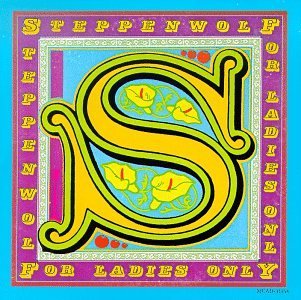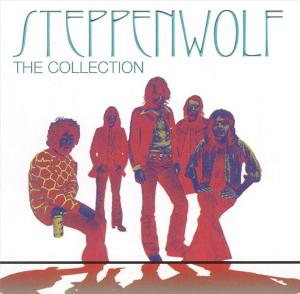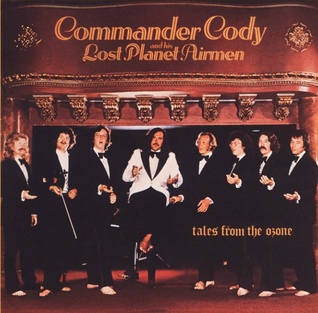
Steppenwolf was an American-Canadian rock band that was prominent from 1968 to 1972. The group was formed in late 1967 in Los Angeles by lead singer John Kay, keyboardist Goldy McJohn, and drummer Jerry Edmonton, all formerly of the Canadian band the Sparrows. Guitarist Michael Monarch and bass guitarist Rushton Moreve were recruited via notices placed in Los Angeles-area record and musical instrument stores.

"Magic Carpet Ride" is a rock song written by John Kay and Rushton Moreve from the Canadian-American hard rock band Steppenwolf. The song was initially released in 1968 on the album The Second. It was the lead single from that album, peaking at number three in the US, and staying in the charts for 16 weeks, longer than any other Steppenwolf song.

Steppenwolf is the debut album by Canadian-American rock band Steppenwolf, released in January 1968 on ABC Dunhill Records.

Early Steppenwolf is a collection of live recordings by Steppenwolf when they were still known as "The Sparrow" [nee: "The Sparrows"]. It was released in July 1969 on the ABC Dunhill Records label.

Monster is the fourth studio album by Canadian-American rock band Steppenwolf. The album was released in November 1969, by ABC Dunhill Records. It was their first LP with new lead guitarist Larry Byrom instead of Michael Monarch. The album was Steppenwolf's most political album, making references to important issues at the time, such as the Vietnam War.

Steppenwolf 7 is the fifth studio album by Canadian-American rock band Steppenwolf. The album was released in November 1970, by Dunhill Records. It is the first Steppenwolf album with new bass player George Biondo. The album’s numerical title reflects the fact that it was the band’s seventh album release for ABC/Dunhill records . While the album featured Steppenwolf's trademark rock and roll sounds, none of the songs were able to make the top 40. The album featured a cover of Hoyt Axton's "Snowblind Friend", their second cover of one of his antidrug songs. Along with "Who Needs Ya", it was one of two singles from the album which made the charts, but fell short of the top 40. The album track "Renegade" is autobiographical for lead vocalist John Kay, recounting his flight with his mother from the Soviet occupation zone to the West in 1948. The intro to "Earschplittenloudenboomer" is spoken by Kay partially in German.

For Ladies Only is the sixth studio album by Canadian-American rock band Steppenwolf. The album was released in November 1971, by Dunhill Records. It is a political concept album mainly about feminism but with several more conventional songs about romance as well, both unusual themes for Steppenwolf. Some critics saw the album as sexist, citing the lyrics of the songs and a photo of a car shaped like a penis alongside the Hollywood Walk of Fame in the gatefold. The album saw the band hinting toward the progressive rock movement that was popular at the time with more complex arrangements and sophisticated keyboard playing, particularly on the title track. Like their previous album, it was accompanied by two minor hit singles which fell just short of the Top 40.

Hour of the Wolf is the eighth studio album by Canadian-American rock band Steppenwolf. The album was released in September 1975, by Epic Records. Andy Chapin replaced long time keyboardist Goldy McJohn on this album.

Steppenwolf Live is primarily a collection of recordings from a single concert early in 1970 at the Santa Monica Civic Auditorium by Steppenwolf staged in support of their 1969 album Monster. Released in April 1970 by Dunhill Records, it contains Steppenwolf's well-known hits: "Born to Be Wild", "Magic Carpet Ride" and "The Pusher", as well as most of the songs from Monster, including three previous top 40 hits, as well as the top 40 hit "Hey Lawdy Mama" from this album.

Rise & Shine is the thirteenth and final studio album by John Kay and Steppenwolf, released in 1990 under the label IRS Records. It features "The Wall", John Kay's song celebrating the fall of the Berlin Wall, and "Rock 'N Roll War", Kay's homage to veterans of the Vietnam War.

Rock & Roll Rebels is the twelfth album by John Kay and Steppenwolf. It was released in 1987, as Qwil Catalog # NU 1560. The LP was distributed by Dominion Entertainment, Inc., and the CD and cassette were distributed by K-tel International (USA), Inc.

16 Greatest Hits is a compilation album by Steppenwolf, released in 1973. It features some of their most famous songs, including "Born to Be Wild", "The Pusher", and "Magic Carpet Ride", and "Hey Lawdy Mama." The album consisted of the 11 tracks from the previous Gold: Their Great Hits album, in the same order as on the two sides of that earlier album, with the addition of the final two tracks on side 1, and the final three tracks on side 2.
The Sparrows was a Canadian blues rock band of the 1960s. Notable for being the first group to bring musician John Kay into the mainstream, the Sparrows later morphed into the popular heavy rock group Steppenwolf.

"The Pusher" is a rock song written by Hoyt Axton, made popular by the 1969 movie Easy Rider which used Steppenwolf's version to accompany the opening scenes showing drug trafficking.

Gold: Their Great Hits is a greatest hits album released by the Canadian-American hard rock band Steppenwolf. The album, released in 1971, charted at #24 on the Billboard Pop Albums charts and was certified "gold" by the RIAA on April 12, 1971. Initial pressings of the album came in a gatefold sleeve, with a detachable poster of the band.

Wolftracks is the tenth album by John Kay and Steppenwolf, released in 1982. It was originally released only in Canada and Australia. The album was the first new studio album in six years for John Kay, featuring a new line-up of Steppenwolf and Kay renaming the group accordingly.

The Collection is a compilation album released in 2003 by the Canadian-American rock band Steppenwolf.
John A. Ware is an American drummer and percussionist known primarily for his session and live performance work.

Tales from the Ozone is an album by American rock band Commander Cody and His Lost Planet Airmen. Their sixth album, it was produced by the musician Hoyt Axton, and recorded at the Record Plant in Sausalito, California. The last studio album to feature most of the band's original lineup, it was released in 1975. It reached #168 on the Billboard 200.
















